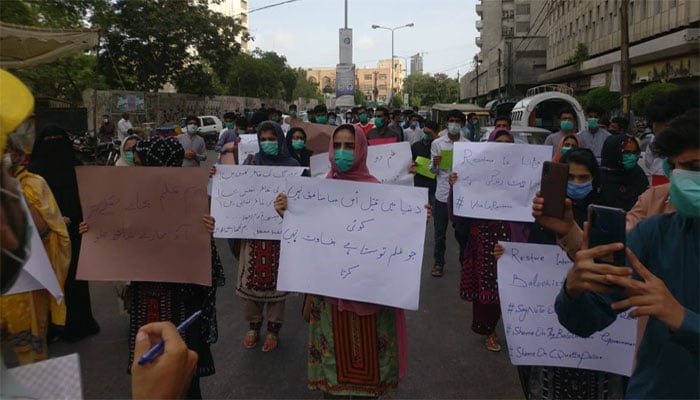Protesters slam students’ arrests in Quetta, seek Internet access to pursue education
A large number of students, civil society and political activists gathered outside the Karachi Press Club on Thursday to show solidarity with Balochistan students who had been arrested and tortured by police in Quetta for protesting for the provision of access to the internet to pursue their higher education.
On Wednesday, police arrested over two dozen students in Quetta while they staged a protest from the Quetta Press Club to the Balochistan Assembly, demanding access to the internet for online classes.
Condemning the arrest and torture on the peaceful students who were protesting for their genuine and legitimate demands, speakers at the Karachi protest said the students of Balochistan had been staging demonstrations for the past few weeks to demand of the government to provide them the Internet service and electricity in the province so that they could pursue their higher education online. “But instead of fulfilling their demands, the government has been using police to arrest and torture them. It is highly condemnable,” said a speaker.
Speakers demanded releasing all the students immediately and taking action against those who had ordered the police to use force against them. The Balochistan government had closed all educational institutions in the province in March after a spike in coronavirus cases. However, the educational institutions had announced that they would be conducting online classes during this period, compelling students to protest against the decision because of poor Internet facilities in the province.
An uninterrupted access to the Internet has become vital for a majority of students in the remote areas of Balochistan after Pakistan’s Higher Education Commission (HEC) directed all universities to switch to online classes in view of the lockdown to limit the spread of the coronavirus in the country.
“The HEC should revisit its policy of online classes for Balochistan because most of the areas in the province lack the basic facilities of electricity and the Internet,” said another speaker. “The majority of students do not even own laptops or smartphones.”
Saazen Baloch, Mahnaz Rahman, Naghma Iqtidar, Dur Bibi, Dostain Baloch, Waseema Baloch, Bakhtwar Baloch, Imran Saqib, and Samar Abbas were prominent among the participants. On June 11, students had arranged donations to arrange transportation for students from various districts of Balochistan to participate in the protest in Karachi in the hope that the mainstream media could highlight their demand for the provision of Internet services.
-
 Paul Anka Reveals How He Raised Son Ethan Differently From His Daughters
Paul Anka Reveals How He Raised Son Ethan Differently From His Daughters -
 'A Very Special Visitor' Meets Queen Camilla At Clarence House
'A Very Special Visitor' Meets Queen Camilla At Clarence House -
 Jodie Turner Smith Shares One Strict Rule She Follows As A Mom
Jodie Turner Smith Shares One Strict Rule She Follows As A Mom -
 Hailey Bieber Reveals KEY To Balancing Motherhood With Career
Hailey Bieber Reveals KEY To Balancing Motherhood With Career -
 Photo Of Jay-Z, Other Prominent Figures With Jeffrey Epstein Proven To Be Fake
Photo Of Jay-Z, Other Prominent Figures With Jeffrey Epstein Proven To Be Fake -
 Hillary Clinton's Munich Train Video Sparks Conspiracy Theories
Hillary Clinton's Munich Train Video Sparks Conspiracy Theories -
 Fans Slam Talk Show Host For 'cringe' Behavior In Chris Hemsworth Interview
Fans Slam Talk Show Host For 'cringe' Behavior In Chris Hemsworth Interview -
 Woman Jailed Over False 'crime In Space' Claim Against NASA Astronaut
Woman Jailed Over False 'crime In Space' Claim Against NASA Astronaut -
 James Van Der Beek’s Close Pal Reveals Family's Dire Need Of Donations
James Van Der Beek’s Close Pal Reveals Family's Dire Need Of Donations -
 Prince William And Harry's Cousins Attend 'Wuthering Heights' Event
Prince William And Harry's Cousins Attend 'Wuthering Heights' Event -
 Hailey Bieber Turns Heads Just Hours After Major Business Win
Hailey Bieber Turns Heads Just Hours After Major Business Win -
 King Charles' Andrew Decision Labelled 'long Overdue'
King Charles' Andrew Decision Labelled 'long Overdue' -
 Timothee Chalamet 'forever Indebted' To Fan Over Kind Gesture
Timothee Chalamet 'forever Indebted' To Fan Over Kind Gesture -
 Columbia University Sacks Staff Over Epstein Partner's ‘backdoor’ Admission
Columbia University Sacks Staff Over Epstein Partner's ‘backdoor’ Admission -
 Ozzy Osbourne's Family Struggles Behind Closed Doors
Ozzy Osbourne's Family Struggles Behind Closed Doors -
 Dua Lipa Claims Long-distance Relationship 'never Stops Being Hard'
Dua Lipa Claims Long-distance Relationship 'never Stops Being Hard'




